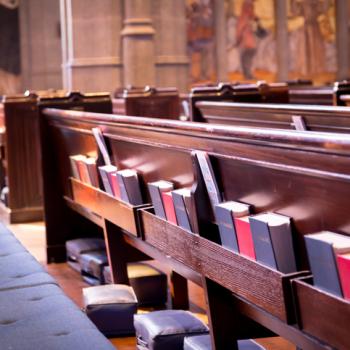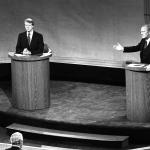The 2024 SBC Annual Meeting
Even for those who are members of a Southern Baptist Church, the machinations of the Southern Baptist Convention can be a bit bewildering. At the close of the SBC Annual Meeting, it is helpful to summarize what the SBC did in Indianapolis this week. As always, there were controversies and oddities. This is the SBC, after all. Controversies included women pastors, IVF, and the Nicene Creed.

IVF
In a very controversial move, the Messengers[1] voted on a resolution opposed to the technology. First, it is helpful to understand what a SBC resolution does: nothing. It does nothing. A resolution is simply the sentiment of the Messengers on that particular day. A resolution has no power over the SBC, its agencies, or its institutions. No resolution is binding on the member churches of the SBC or their clergy. Resolutions are a giant nothing burger.
In reading press accounts, it becomes obvious that the press, even the religious press, does not understand how Baptist governance works, else they would treat it for what it is.
Now taking up the topic of IVF might have been a surprise, but how the SBC would come out on IVF should surprise no one. The SBC has long believed that life begins at conception. If correct, then IVF often destroys life through “selective reduction”[2] and freezes viable embryos for indefinite periods. Often these frozen embryos will be destroyed as well. No one should be surprised that the SBC is opposed to IVF.
What many critics miss is that the SBC is not making a religious argument here exactly. It is making a scientific argument. Skye Perryman of Democracy Forward argues that opposing IVF is an example of how far-right political groups oppose “evidence-based” medical therapies. She is precisely wrong. The question is, “when does life begin,” or “when does a baby become a person?” These are scientific questions.
Here’s what you need to know to understand that SBC resolution opposing IVF
Resolutions Are a Bad Idea
The best stance is to treat any resolution from the SBC meeting with a giant shrug. The majority of messengers at the SBC Annual Meeting are against IVF. That is not shocking. It is also not important.
It would be best for the SBC to jettison the resolutions part of the meeting. During the resolutions, Messengers will lurch from one controversial issue to another with all the grace of a drunken sloth. Controversies will emerge. Messengers will utter cringe-worthy comments. These are the best outcomes. At worst, the resolution section can lead to frustration and embarrassment. A few years ago, a resolution was passed tying the SBC to Critical Race Theory. Most messengers now view that resolution with a bit of contempt. So, when observing the SBC annual meeting, focus on what the SBC does, not the resolutions.
Law Amendment
Very controversial among the SBC messengers was the Law Amendment. The Law Amendment would have declared that a congregation with a woman pastor of any kind was not in “friendly cooperation” with the SBC. The amendment would have affected women who are “Children’s Pastors,” or “Worship Pastors” along with those who are more traditionally the objects of SBC ire, women who are “Senior Pastors.” Stunningly, the amendment failed to get 2/3s support. 61% of the messengers were supportive, but that was not enough to amend the constitution.
Some observers on both sides miss what the vote means. Both those who support women in the pastorate and who are against it argue that the amendment’s failure means an opening for women to be pastors. It does not mean that.
FBC Alexandria VA
The messengers reflected their opinion on the matter in a different vote. With 91% in favor, the SBC voted to oust First Baptist Church Alexandria, VA. The church has a woman whose title is “Pastor of Women and Children” on its staff. That title should not be outside the parameters of the SBC’s confessional document, the Baptist Faith and Message 2000 (BFM). The authors of the BFM were clear that the term “pastor” referred to someone who was a “Senior Pastor,” or at least someone who was in a teaching role over men or mixed groups. The Women and Children’s Pastor at FBC Alexandria does not fit that description.
What happened, however, is that the church is open to women serving in pastoral roles. A sister church reported FBC Alexandria to the SBC and, after investigation, the SBC decided FBC Alexandria was not in friendly cooperation. The messengers approved the removal of the church by a 9-1 margin.
To suggest that the SBC is now open to women in ministry is a misreading of the meeting. It is probable that some of those who voted against the Law Amendment were in favor of women pastors. It is highly probable, however, that most were not in favor of women pastors, but thought the Law Amendment was defective.
The Nicene Creed
The Messengers were also asked to add the Nicene Creed to the BFM. In a parliamentary move, the motion was referred to the Executive Committee. This could mean a couple of different things. It could mean that the leaders of the SBC are looking for ways to bury the amendment in parliamentary and institutional gobbledygook. It could also mean that they want to give it serious consideration.
What was shocking about the discussion was that one candidate for SBC President, David Allen, expressed reservations about the “wording” of the Creed during a question and answer session with all the candidates. With the theological precision of a cement mixer, Allen confused the definitions of ecumenism and ecumenical. Ecumenism is the desire for all Christian denominations to work together and press through their differences toward practical unity. In practice, it often leads to theological hash. “Ecumenical” when spoken about the Creed means the general consensus of the people of God throughout history. Stunningly, no one asked Allen for clarification.
David Allen
Allen was not just an odd contender for the SBC Presidency. Allen was Dean of the School of Theology at Southwestern Baptist Theological Seminary from 2004-2016. Currently, he serves as the Dean of Biblical Preaching at Mid-America Baptist Theological Seminary. He should know better than to say what he said.
Even after expressing reservations about the Nicene Creed, Dean got over 20% of the vote in the first ballot for SBC president. 20% of the Messengers supported a man who could not give full approval to one of the foundational Christian documents. While the state of women in the pastorate and the resolution on IVF made news, the important issue is theological orthodoxy. Will the SBC be faithful to the orthodox Christian faith, or will it descend into heresy?
Decline and Abuse
Another important thing to note. The SBC is in a serious decline in both membership and attendance. The Convention has lost millions of members in the last decade. Mysteriously, no leader or agency articulated a plan to arrest the decline. Hope is not a plan.
The SBC also did little about its sexual abuse scandal. When it comes to protecting kids, hope is not a plan either.
[1] For those who are unfamiliar with how the SBC works, every cooperating SBC church can send messengers to the Annual Meeting of the SBC. This meeting is often called the Convention. Messengers vote on behalf of their churches. At this year’s meeting, there were a little more than 10000 messengers that attended. Keep in mind there are over 40,000 SBC churches.
[2] A ghastly euphemism for the process of aborting weaker babies so that the stronger ones have a better chance of survival.














